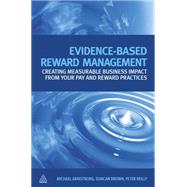
Note: Supplemental materials are not guaranteed with Rental or Used book purchases.
Purchase Benefits
What is included with this book?
| Acknowledgements | p. ix |
| Praise for Evidence-Based Reward Management | p. xi |
| Introduction | p. 1 |
| The concept of evidence-based management | p. 12 |
| Introduction | p. 12 |
| Evidence-based management defined | p. 13 |
| Approaches to evidence-based management | p. 14 |
| Evidence-based management and research | p. 15 |
| Evidence-based management and benchmarking | p. 18 |
| The myth of best practice | p. 19 |
| Best fit | p. 21 |
| Evaluation of HR management practices | p. 24 |
| Evaluation through measurement | p. 25 |
| Quantitative evaluation | p. 26 |
| Qualitative evaluation | p. 29 |
| Chapter summary | p. 30 |
| The concept of evidence-based reward management | p. 33 |
| Introduction | p. 33 |
| The meaning of evidence-based reward management | p. 34 |
| The meaning of integrated reward management | p. 34 |
| The ethical dimension | p. 34 |
| The role of reward strategy | p. 35 |
| High-performance working | p. 36 |
| Engagement | p. 39 |
| Attraction and retention of talent | p. 44 |
| Evidence-based reward in practice | p. 45 |
| Chapter summary | p. 46 |
| The reality of evidence-based reward management | p. 50 |
| Introduction | p. 50 |
| What is or is not happening? | p. 51 |
| Why there is little interest in evidence-based reward management | p. 55 |
| Why is evidence-based reward management important? | p. 58 |
| What evidence-based reward management aims to achieve | p. 59 |
| Chapter summary | p. 60 |
| Case study: Kent County Council: effectiveness in building a great place to work | p. 60 |
| The impact of evidence-based HR and reward management | p. 70 |
| Introduction | p. 70 |
| Measuring the impact of human resource management | p. 71 |
| Measuring the impact of reward | p. 76 |
| Chapter summary | p. 79 |
| Case study: McDonald's restaurants: aligning reward strategy to business objectives through employee engagement | p. 80 |
| The process of evidence-based reward management | p. 92 |
| Introduction | p. 92 |
| The context: reward practices under scrutiny | p. 93 |
| The challenges: the questions to answer | p. 94 |
| Assessing reward effectiveness | p. 96 |
| The components of evidence-based reward management | p. 98 |
| Defining reward goals and success criteria | p. 101 |
| Setting success criteria and moving on to assess them | p. 115 |
| Chapter summary | p. 117 |
| Case study: an analytical but values-driven approach to managing reward and incentive arrangements at Standard Chartered Bank | p. 118 |
| Reviewing reward | p. 129 |
| Introduction | p. 129 |
| The process of reward review | p. 131 |
| Approaches to reward review | p. 132 |
| Components of a reward review | p. 145 |
| Internal research | p. 149 |
| External research | p. 153 |
| Chapter summary | p. 158 |
| Case study: DSG International plc: reward effectiveness in driving a business turnaround | p. 158 |
| Measuring and evaluating reward | p. 169 |
| Introduction | p. 169 |
| Measuring reward | p. 170 |
| Evaluating reward | p. 181 |
| Chapter summary | p. 188 |
| Case study: evidence-based recruitment and reward at the NSPCC | p. 189 |
| Developing and implementing reward | p. 198 |
| Introduction | p. 198 |
| Analysing findings and agreeing improvements | p. 198 |
| Developing new and improved rewards | p. 202 |
| Developing with implementation in mind | p. 215 |
| Implementing, operating and reviewing more effective rewards | p. 217 |
| Chapter summary | p. 224 |
| Case study: KPMG: delivering effectiveness through performance-related and total rewards | p. 225 |
| Conclusions on evidence-based reward management | p. 237 |
| Introduction | p. 237 |
| The six components of evidence-based reward | p. 237 |
| Criteria for assessing reward practices | p. 239 |
| Views of practitioners | p. 241 |
| A final word | p. 243 |
| Index | p. 245 |
| Table of Contents provided by Ingram. All Rights Reserved. |
The New copy of this book will include any supplemental materials advertised. Please check the title of the book to determine if it should include any access cards, study guides, lab manuals, CDs, etc.
The Used, Rental and eBook copies of this book are not guaranteed to include any supplemental materials. Typically, only the book itself is included. This is true even if the title states it includes any access cards, study guides, lab manuals, CDs, etc.